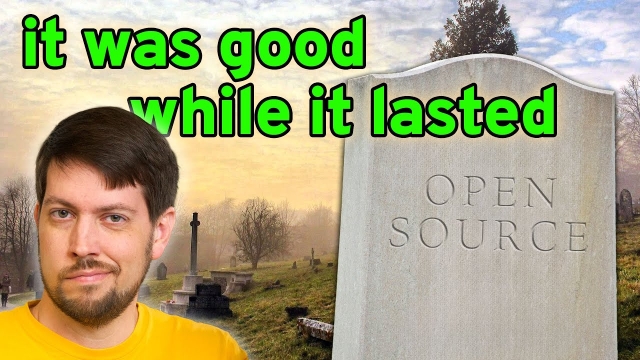As free money dries up and profits slow, companies slash headcount almost as fast as #opensource community trust.
My thoughts on IBM's HashiCorp buyout: https://www.youtube.com/watch?v=hNcBk6cwim8

Corporate Open Source is Dead
Nobody likes being rugpulled. But lately, it's going around like a virus.Why are so many former open source darlings selling out or relicensing? And is there...YouTube
Tyler K. Nothing
in reply to Jeff Geerling • • •R. L. Dane :debian: :openbsd:
in reply to Jeff Geerling • • •It's so rare to see the difference between #FreeSoftware and #OpenSource explained in "mainstream" technical media.
Thanks for bringing attention to that.
libreuser
in reply to R. L. Dane :debian: :openbsd: • • •@RL_Dane I agree, but we should never promote Open Source. It's a harmful movement of proprietary shills. We should use the term Free Software instead.
Also it's a shame he says it's ok to make proprietary software if you want to make money. It's possible to make money in ethical ways and the FSF even encourages people to sell Libre Software: https://www.gnu.org/philosophy/selling.html
Selling Free Software - GNU Project - Free Software Foundation
www.gnu.orgJeff Geerling
in reply to libreuser • • •libreuser
in reply to Jeff Geerling • • •@RL_Dane We need to make people realise that software freedom is a basic right that we deserve and that it's unethical for anyone to take it away from us. The Open Source movement doesn't say that proprietary software is wrong, so most people are still unaware of this. That's why companies love using that term so much. It allows them to contribute and show how good they are, but at the same time they continue to make proprietary software and abuse their users. You've mentioned some of this in your video, so thank you for that.
Companies switching to proprietary licenses is a bad thing that we should criticise, but they still made a valuable contribution to free software and I don't think that it would have been better if they never made those contributions.
Miah Johnson
in reply to Jeff Geerling • • •Charlie Balogh
in reply to Jeff Geerling • • •Great video. Thanks for making it. I think this is now painful, but will be good in the end, as it creates clarity...
"Corporate Controlled Open Source" is certainly a thing, such projects are usually happy to throw out/reject everything that is "in their way", or perceived as a maintenance burden. Including support for niche OS/CPU architectures, and even use cases, and heavily gatekeeping contributions, while they talk being "free and open".
They finally show their true colors.
Drew Kirkman
in reply to Jeff Geerling • • •Luke Nelson
in reply to Jeff Geerling • • •Jeff Geerling
in reply to Luke Nelson • • •ティージェーグレェ
in reply to Jeff Geerling • • •I think I mostly concur, though long ago I had to dig up NNTP archives to show ioerror that terms "open source" and "free software" were in use long before the FSF and such attempted to demand that such phrases refer to things with such specificity.
I don't feel like redoing that work (in large part because DejaNews' Usenet archives were made functionally useless by Alphabet Inc./Google the last time I took a gander at it).
Having written as much, it was at least my personal experience, that the Vagrant so-called "community" were full of horrible people long before IBM was offering over a billion dollar buy out to HashiCorp, e.g. this makes passing reference to an experience I had with them many years ago (circa 2012 maybe?): https://rap.social/@teajaygrey/112311582854377285
ティージェーグレェ (@teajaygrey@rap.social)
rap.socialPartially Stochastic
in reply to Jeff Geerling • • •h3artbl33d :openbsd: :ve:
in reply to Jeff Geerling • • •Jeff Geerling
in reply to h3artbl33d :openbsd: :ve: • • •Mackaj
in reply to Jeff Geerling • • •Agree with everything you said there Jeff 👍🏻
I'd not really given much thought to the difference between Free Software and Open Source before today and just treated them as if they were synonymous. I'll pay more attention in future.
Greg Brooks
in reply to Jeff Geerling • • •How do you say SUSE?
YouTubenassau69
in reply to Jeff Geerling • • •it’s not that corporate open source is dead, but rather the cloud providers have killed server corporate open source.
Corporate open source continues and thrives elsewhere like programming languages and desktop (Windows Terminal, Visual Studio Code, etc)
I Forget
in reply to Jeff Geerling • • •LB (parent): I somehow never ran across this person before today, and I instantly started mainlining his videos. I've found it uncommon to see videos that are simultaneously unpretentious, technically solid, and excited about free software without being dogmatic. I'm so happy to find one more!
Anyway, that video is a clear, friendly, and nondogmatic explanation of how tech corporations are using bad faith license agreements to seem "open" but ultimately abuse dev goodwill. Short and very sweet!